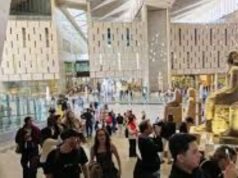 “A very unexpected but very welcome development, which may now temporarily prevent a full scale trade war” is the response of World Travel & Tourism Council (WTTC) President & CEO, David Scowsill, to the European Union’s decision to postpone the full introduction of its emissions trading scheme (ETS).
“A very unexpected but very welcome development, which may now temporarily prevent a full scale trade war” is the response of World Travel & Tourism Council (WTTC) President & CEO, David Scowsill, to the European Union’s decision to postpone the full introduction of its emissions trading scheme (ETS).
WTTC has long argued that a market-based global mechanism is the best way for aviation to balance its huge economic and social contribution with its impact on climate change.
However, WTTC also advises the European Union to avoid the imposition of the ETS for intra-European air travel. The EU has recognised that the issue needs to be tackled on a global level, so it seems illogical to proceed with a European-only scheme which loads European airlines with the cost and complexity of operating the scheme.
The European decision to open up its skies to foreign airlines conveys the message that aviation is truly a global industry sector and therefore a global solution has always been considered the most desirable and logical way to avoid unnecessary regional distortions.
Although there are differing opinions from European airlines regarding the freeze on the policy implementation, the market will grow competitively and therefore the Travel & Tourism industry will see more jobs and multiplier effects. WTTC supports the global role to be played by the International Civil Aviation Organisation (ICAO) and believes the process should be allowed to run its course towards establishing a global market-based mechanism to manage carbon emissions.
David Scowsill, President & CEO, WTTC, said “The EU has taken two steps forward and one step back on emissions trading. It has recognised that it must not go it alone on emissions trading and the one-year standstill on the global scheme is both unexpected and welcome. However, the decision to retain ETS for intra-European aviation is illogical and possibly counter-productive. It is apparent that the original imposition of the emission trading scheme brought the world close to a trade war on this issue, with governments enacting legislation to forbid their national airlines to comply. The pressure is now on government to deliver a solution through ICAO, before the industry faces another heated debate, deterring barriers for growth in this important global industry.”











